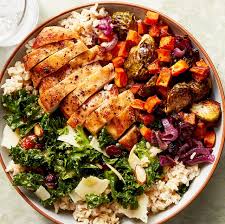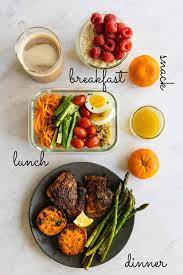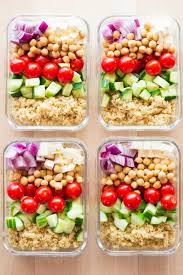Nourishing Meal Prep Inspirations for a Healthier You

Healthy Meal Prep Ideas
Meal prepping is a great way to ensure you have healthy and delicious meals ready to go throughout the week. By planning and preparing your meals in advance, you can save time, money, and make healthier choices. Here are some easy and nutritious meal prep ideas to help you stay on track:
Overnight Oats
Prepare jars of overnight oats by combining rolled oats, milk (or a dairy-free alternative), chia seeds, and your favourite toppings like fruits, nuts, or honey. Leave them in the fridge overnight for a quick and nutritious breakfast option.
Veggie Stir-Fry
Cut up a variety of colourful vegetables such as bell peppers, broccoli, carrots, and snap peas. Stir-fry them with some lean protein like chicken or tofu and your choice of seasonings. Divide into containers for easy lunches or dinners.
Quinoa Salad Jars
Cook quinoa and let it cool before layering it in jars with mixed greens, cherry tomatoes, cucumbers, feta cheese, and a light vinaigrette dressing. These portable salad jars are perfect for a nutritious on-the-go meal.
Baked Sweet Potatoes
Bake several sweet potatoes in advance and store them in the fridge. They can be easily reheated for a quick side dish or topped with ingredients like black beans, avocado, salsa, and Greek yoghurt for a satisfying meal.
Protein-Packed Snack Boxes
Create snack boxes with compartments filled with hard-boiled eggs, sliced turkey or chicken breast, hummus with veggie sticks, whole grain crackers, and nuts. These snack boxes are perfect for keeping hunger at bay between meals.
With these healthy meal prep ideas at your disposal, eating well throughout the week can be both convenient and enjoyable.
9 Essential Tips for Effective and Nutritious Meal Prep
- Plan your meals in advance to ensure a balanced diet
- Include a variety of fruits and vegetables for nutrients
- Choose whole grains over refined grains for added fibre
- Opt for lean proteins such as chicken, fish, or legumes
- Limit processed foods and added sugars in your meal prep
- Use herbs and spices instead of salt for flavouring dishes
- Prepare meals in bulk and portion them out for convenience
- Invest in good quality storage containers to keep food fresh longer
- Experiment with different recipes to keep meal prep interesting
Plan your meals in advance to ensure a balanced diet
Planning your meals in advance is a key strategy for maintaining a balanced diet. By taking the time to plan out your meals, you can ensure that you are incorporating a variety of nutrients into your diet and avoiding the temptation of unhealthy food choices. This approach allows you to make thoughtful decisions about portion sizes, food groups, and overall calorie intake, leading to a more balanced and nourishing diet that supports your health and well-being in the long run.
Include a variety of fruits and vegetables for nutrients
Including a variety of fruits and vegetables in your meal prep is essential for ensuring you receive a wide range of nutrients. Different coloured fruits and vegetables contain various vitamins, minerals, and antioxidants that are beneficial for overall health. By incorporating a rainbow of produce into your meals, you not only enhance the flavour and visual appeal but also boost your immune system, support digestion, and promote optimal well-being. Make sure to mix and match different types of fruits and vegetables to create balanced and nutritious meals that will keep you feeling energised and satisfied.
Choose whole grains over refined grains for added fibre
Opting for whole grains instead of refined grains is a smart choice when planning healthy meal prep. Whole grains, such as brown rice, quinoa, and whole wheat pasta, are rich in fibre, providing numerous health benefits like improved digestion and increased satiety. By incorporating these nutrient-dense options into your meal prep routine, you can enhance the nutritional value of your meals and support overall well-being.
Opt for lean proteins such as chicken, fish, or legumes
When engaging in healthy meal prep, it is advisable to opt for lean proteins like chicken, fish, or legumes. These protein sources are not only low in fat but also rich in essential nutrients that support overall health. Incorporating these lean proteins into your meal prep ensures that you are fuelling your body with quality ingredients that promote muscle growth and satiety while keeping calorie intake in check. By choosing these wholesome options, you can create balanced and nutritious meals that contribute to your well-being.
Limit processed foods and added sugars in your meal prep
When focusing on healthy meal prep, it is important to limit the inclusion of processed foods and added sugars in your meals. By reducing the consumption of processed foods and sugars, you can significantly improve the nutritional value of your prepped meals. Opting for whole, unprocessed ingredients and natural sweeteners can help support a balanced diet and promote overall well-being. Making conscious choices to minimise processed foods and added sugars in your meal prep can contribute to better health outcomes in the long run.
Use herbs and spices instead of salt for flavouring dishes
When it comes to enhancing the taste of your meals while keeping them healthy, opting for herbs and spices over salt is a smart choice. Herbs like basil, rosemary, and thyme, along with spices such as cumin, paprika, and turmeric, not only add depth and complexity to your dishes but also bring a wealth of health benefits. By using herbs and spices creatively in your meal prep, you can reduce your sodium intake without compromising on flavour, making your culinary creations both delicious and nutritious.
Prepare meals in bulk and portion them out for convenience
Preparing meals in bulk and portioning them out is a smart strategy for convenient and healthy eating. By dedicating some time to cooking larger quantities of food in advance, you can save time during busy weekdays and ensure that nutritious meals are readily available. Portioning out the meals into individual containers not only helps with portion control but also makes it easy to grab a meal on-the-go or heat up a quick, balanced dinner without the hassle of cooking from scratch every day. This approach can help you stick to your healthy eating goals while enjoying delicious homemade meals throughout the week.
Invest in good quality storage containers to keep food fresh longer
Investing in high-quality storage containers is a valuable tip for successful meal prepping. These containers not only help in organising your prepared meals efficiently but also play a crucial role in keeping food fresh for longer periods. By choosing durable and airtight containers, you can maintain the flavour, texture, and nutritional value of your meals, ensuring that they stay delicious and ready to enjoy whenever you need them. Good storage containers are an essential asset in the journey towards healthier eating habits through meal prep.
Experiment with different recipes to keep meal prep interesting
To maintain excitement and variety in your meal prep routine, it is beneficial to experiment with a range of recipes. Trying out new dishes not only keeps your meals interesting but also introduces you to different flavours and ingredients that can enhance your overall nutrition. By exploring diverse recipes, you can discover unique combinations that cater to your taste preferences while ensuring a balanced and healthy diet. Embracing culinary creativity in your meal prep endeavours adds a fun and dynamic element to the process, making healthy eating an enjoyable and sustainable habit.



